 The new chairperson of the Fresh Produce Exporters’ Forum, Wayne Mudge (right), grew up on a fruit farm. He has witnessed many changes within the fruit industry, some of them heartening (the opportunities available to an ever wider group of South Africans), some of them concerning (the deteriorating state of logistics).
The new chairperson of the Fresh Produce Exporters’ Forum, Wayne Mudge (right), grew up on a fruit farm. He has witnessed many changes within the fruit industry, some of them heartening (the opportunities available to an ever wider group of South Africans), some of them concerning (the deteriorating state of logistics).
Wayne, one of the founders of Cape Five Exports, says he was there years ago when the fruit industry was debating whether an association like Fresh Produce Exporters’ Forum was needed. “I’ve been there since day one. I feel very committed to the Fresh Produce Exporters’ Forum. It’s very important that the fruit industry’s interests are represented and we do a good job of that. We have a fantastic team behind us,” he says.
“In the 24 years that I’ve been in the fruit industry, 2021 has been our toughest year ever. The external challenges have been incredible. The amount of containers available this citrus season wasn’t enough, I can tell you, and timing is everything in the fruit industry. The problems have been so widespread that it’s been difficult to avoid getting caught up in them.”
On the other hand, the South African fruit industry has a better working relationship with its government than it’s ever had, which has been, he remarks, one of the silver linings of the Covid crisis. “Digital meetings have really been a paradigm change in the process of getting people together.”
Reduction in shipping routes to the East curtails the fruit trade
Vessels are still bypassing South African ports, a decision closely related to South Africa’s inefficient state-run ports which, in his view, need the private sector to improve and expand.
For the first time Western Cape farmers have been trucking their Middle East and Far East-bound containers to the port of Durban, otherwise, he explains, it might sit in Cape Town for weeks before leaving, but this is now putting more trucks on an already overburdened road system.
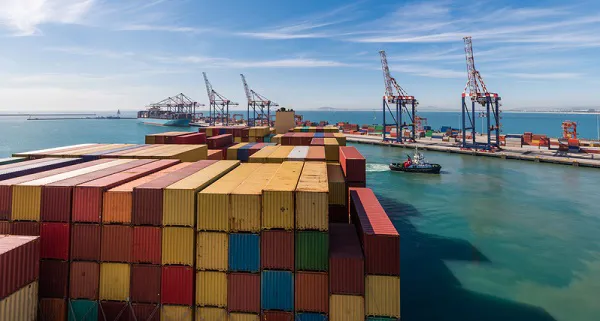 Cape Town Container Terminal (Copyright: Chris Troch Ι Dreamstime.com)
Cape Town Container Terminal (Copyright: Chris Troch Ι Dreamstime.com)
“A lot of the factors impacting on us are beyond our control, driven by yields on other routes where shipping lines earn far more than they can earn on shipping fruit from South Africa and we’re an absolute victim of that. Where we have more than enough capacity and opportunities to the Middle East and particularly the Far East, that’s been curtailed by the shipping lines reducing their services and their calls to South Africa.”
A typical example of the effect of the shipping disruptions are the reduced services available from South Africa to West Africa, he says. West Africa is a major destination for South African apples.
“A year ago we had many options to West Africa and today we have one main option, MSC, and another option although that is a longer voyage. And as you know, as soon as you only have one real option, the rates go up.”
According to shipping lines, the disruptions are likely to continue through 2022.
“Particularly Port Elizabeth has lost a lot of opportunities, with more fruit on the road to be shipped to Durban or Cape Town and that doesn’t help Durban in the middle of the citrus season, does it? For the fruit growers in the Eastern Cape this is a major problem.”
Disruptions pushed EU citrus shipments past its usual window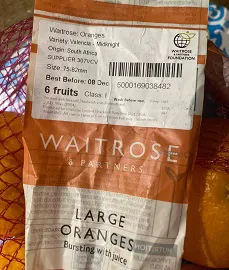 The past citrus season showed that as soon as there’s any stress on the system, everything can’t be exported in good time.
The past citrus season showed that as soon as there’s any stress on the system, everything can’t be exported in good time.
Right: South African oranges have been in Europe and the UK until later than usual
“It’s easy to blame the major disruptions, which there was, but it showed we have no room for any problems. The smaller issues around logistics got engulfed by the major ones: our railway system is barely functional, despite a lot of effort by quite a few players to put more containers on rail but there simply isn’t rolling stock or the systems in place to accommodate it.”
“One of the consequences of our late shipments of citrus to the EU, as we know from years of experience, is that the later we go, the more citrus black spot we pick up. There was the force majeure situation because of the riots around Durban which started the delay right at the peak of the orange season. Now that the dust has settled, we can see that the European plant health authorities picked up many more instances of citrus black spot than they might have if everything advanced smoothly and it’s become a source of tension between them and us.”
Fruit industry has to be more forthright
“We have to be more forthright about what’s needed and we have to do that in concert with other export-oriented industries to get movement. The ports have become a real problem, not only for the fruit industry but for many other industries. It’s become a hand brake on growth. For many years it’s been difficult but I think there is more willingness to solve the problem around the ports.”
Checking lemons before shipment
He remarks: “What counts in the favour of agriculture, and in particular of horticulture, is that we absorb a lot of labour, often low-skilled labour. Agriculture is actually a force for good, a fact which is not always appreciated by people outside of the business. I’ve seen it change over the years. The amount of opportunities that agriculture can create for people who have had very few educational opportunities, is enormous. On a farm you give people the opportunity to develop themselves and people really take the opportunity. I’ve seen it many times.”
On the other hand, he concedes that the horticultural sector is not sufficiently transformed, a point also pressed by government, and it’s something the industry is addressing. Grower organisations have made it a priority but there is definitely more that could be done, he says. “I would like to see our members approach it less as a matter of compliance and more as a way of embracing necessary change.”
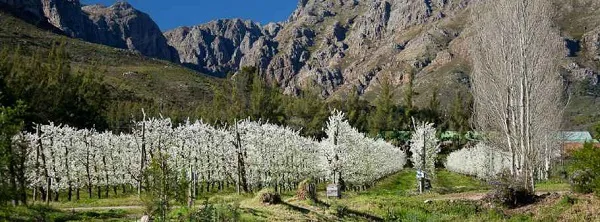 A plum orchard amid the mountains of the Boland, Western Cape
A plum orchard amid the mountains of the Boland, Western Cape
There’s more to China than the high-end gifting lines
“We can’t grow our production without increasing our market and that needs a lot of attention. The world is in quite a difficult space in terms of protectionism, it’s a very difficult job for our government to push this but we have to keep pushing for opportunity, particularly in Asia.”
“I hope the next commodity on which we negotiate access into China, avocados, and then stonefruit after that, doesn’t take as long as pears have taken. Last season with the plums was an exact example of why we need more market access. We hadn’t had such a big crop for many years, and then we had a big jump and we didn’t have enough market to put the fruit into, especially in the peak weeks.”
China would definitely hold potential for South African plums. “We can get there quicker than Chile, we have some good varieties and there’s a lot of new varieties coming in that would be suited for that market. It would change our plum and stonefruit business in the same way it totally changed the balance in the citrus industry when we got access to China. It changed the equation for South African growers, especially so for grapefruit.”
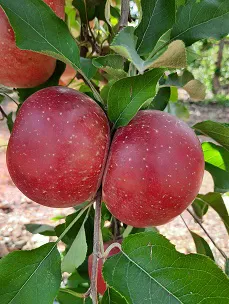 However, he cautions, gaining access to China is not like switching on a lightbulb.
However, he cautions, gaining access to China is not like switching on a lightbulb.
Right: South African Fuji apples
“You’ve got to understand what clients want. China is really a massive market and there’s so much more we can do. In our own business, over three years we’ve increased the share that China is taking driven by Chinese retailers and their preferences and what they know they can sell to customers, rather than just supplying the more high-end gifting side, a lot of cosmetically perfect fruit and big sizes. We look more at the day-to-day eating side, and then suddenly small fruit in bags is an item they know they can sell.”
South Africa’s apple business in China is growing every year; the performance of grapes in that market has been disappointing, he says.
Trade with India has grown despite high tariffs
The EU and UK remain important markets, but for many South African fruit exporters growth has come from other parts of the world.
“Trade with India has grown a lot, despite the hurdles like the very high tariffs on fresh produce, not only on South African produce. Lower tariffs would definitely help the business.”
India is a welcome counterpoint to Dubai which is overtraded in his opinion.
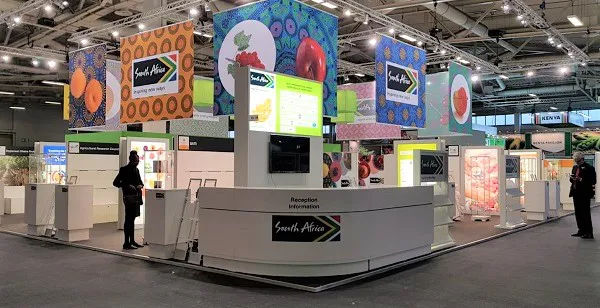 A familiar sight at international trade shows: the stand of Fruit South Africa, the Fresh Produce Exporters’ Forum and the Department of Trade and Industry at Berlin Fruit Logistica in 2020
A familiar sight at international trade shows: the stand of Fruit South Africa, the Fresh Produce Exporters’ Forum and the Department of Trade and Industry at Berlin Fruit Logistica in 2020
The Fresh Produce Exporters’ Forum has made only two international trips since March 2020. Wayne says his colleagues who recently went to the Middle East reported that it was fantastic to meet customers again, and orders have already increased since the visit.
“You do lose momentum without that face-to-face contact,” he notes.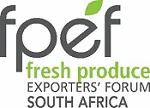 For more information:
For more information:
Wayne Mudge
Fresh Produce Exporters’ Forum
Tel: +27 21 526 0474
https://fpef.co.za/
